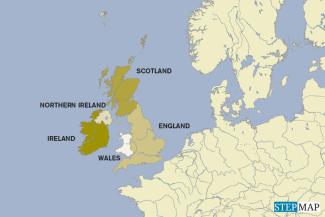Brexit
English populism and Scottish nationalism

The anti-EU movement gained momentum thanks to years of austerity, the slow recovery after the global financial crisis and a mainstream press controlled almost entirely by right-wing owners. Reckless politicians spread falsehoods about the EU imposing stupid rules about everything from the curvature of bananas to the rights of criminals, and stated that Britain urgently had to “take back control”.
A referendum was held in 2016, and to everyone’s surprise, “Leave” won. Exiting the EU proved more difficult than expected, however, and it may yet not happen at all. If the December 12 general election results in a pro-EU majority or a hung parliament, the next government might cancel Brexit or hold a second referendum.
The potential impact of Brexit has caused dismay not only in Northern Ireland (see main story), but also in Scotland, where 62 % voted to remain in the EU. The pro-independence Scottish Nationalist Party is in favour of remaining in the EU and has recently been gaining ground. Opinion polls predict it will do very well in the December elections. It might eventually lead Scotland back into the EU – and then there could be a new hard border in Great Britain.







